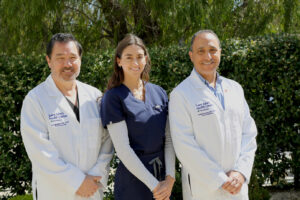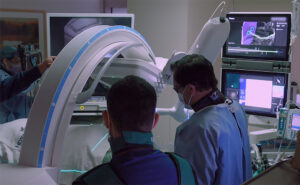Lung Cancer and Screening
Whether you are an active smoker or quit years ago, undergoing a lung cancer screening can aid in the early detection of lung cancer, when it is most treatable and offers the greatest chance of survival. CT scan screening for lung cancer is now officially recommended by Medicare, American College of Chest Physicians, American Association of Thoracic Surgery, AMA, and American Cancer Society.
Does lung cancer screening really work?
for those at greatest risk, such as people over the age of 55 who meet certain criteria.
The final and most convincing proof that screening works, comes from the National Lung Cancer Screening Trial where > 50,000 people were randomized to either a chest x-ray or a low dose chest CT scan once per year. Lung masses were found more often in the CT group than in the CXR group (27.3% vs. 9.2%) because the CT can see much smaller masses than the CXR. To be in the trial, all patients had to be > 55 years and smoked at least 1 pack per day for 30 years. The study showed a 20% reduction in death from lung cancer in the screened group.
Unfortunately, lung cancer is usually found at an advanced stage that is not curable, so it kills more people than breast, colon and prostate cancer combined. That’s why it is important to get screened for lung cancer if you have a history of smoking. Screening programs help find cancer at an earlier stage, where it is more curable with better survival rates.
Lung Cancer Detection:
What are the first common signs of lung cancer?
The first common signs of lung cancer can be subtle and often resemble other respiratory conditions. Persistent coughing that worsens over time, sometimes with blood or rust-colored sputum, is a notable early sign. Shortness of breath, wheezing, and chest pain that intensifies with deep breaths, coughing, or laughter may also occur. Additionally, unexplained weight loss, fatigue, and recurrent respiratory infections like bronchitis or pneumonia can indicate lung cancer. If you experience any of these symptoms, it’s crucial to seek medical advice promptly. Early detection through lung cancer screening can significantly improve outcomes, so discuss your symptoms and screening options with your healthcare provider.
Who should undergo screening for lung cancer?
- Age 55-80 years
- People who have smoked at least 1 pack per day for 20 years (20-pack years)
- Or current smokers or former smokers who quit smoking within the last 15 years
Click here to watch a video about the lung screening program and eligibility criteria. Click here to find a screening location near you.
What is the screening test?
A low-dose CT scan is designed to look for signs of lung cancer even before symptoms are present. Because a low-dose CT scan involves a lower amount of radiation exposure than a traditional CT scan, it is the only effective, proven way to screen for lung cancer. Between 3% and 51% of the CT scans will show a mass in the lung. Of the people with a mass in the lung, between 1% and 5% have cancer.
CT scans are highly effective for lung cancer screening because they provide detailed cross-sectional images of the lungs. These scans can detect small nodules or masses that might be indicative of cancer, often before symptoms appear. This early detection is crucial, as it significantly improves the chances of successful treatment. Unlike standard X-rays, CT scans can identify even minute abnormalities, making them a preferred method for screenings.

What happens during a lung cancer screening?
- A lung cancer screening specialist will prepare you for what to expect from the screening.
- You will undergo a low-dose chest CT scan.
- After the scan, you will receive the results from your lung cancer screening specialist.
- You may also want to discuss your results with your physician or qualified nurse practitioner.
- Our team will let your doctor know your results, so he or she can recommend next steps if needed.
Who should review the CT scan with you?
The CT scan should be reviewed by a radiologist with special expertise in evaluating lung masses or a specialist (e.g. a thoracic surgeon) who frequently evaluates screening CT scans with masses. Because <5% of masses found by screening are cancer, an expert is needed to determine which nodules to follow and which to diagnosis or treat.
Who pays for the screening CT (computed tomography)?
A screening CT for lung cancer is covered by Medicare and most insurance companies, such as Blue Cross, Blue Shield, Aetna, and United Health Care. You can call the phone number on the back of your health insurance card to make sure that your insurance carrier covers lung cancer screening. The scan can be scheduled by calling (310) 829-8686.
What are the steps of lung cancer screening?
We will make an appointment for you for your screening, which will include a chest scan. Prior to getting scanned, you will need to change into an exam gown. The material of the gown does not show on the scan unlike some materials found in clothing garments. You will be asked to lie on your back on the table of the CT machine with your arms raised above your head. The table will then slowly pass through the center of a large machine while detailed X-ray images are taken of your lungs. It is important to stay very still during the scan to prevent any possible blurring of the images; at times, you may be asked to hold your breath to help improve clarity. While in the CT machine, you may hear a humming sound as the emitter inside the machine rotates. Though the scanner will cover your entire body for a short period of time, both ends of the machine are completely open for you to see and hear outside the machine. The physician or technician preforming the scan is able to see and hear you at all times.
Getting your CT scan
A low-dose CT scan is a quick, painless, and non-invasive approach to screen for lung cancer. This type of CT scan uses no dyes or injections and requires nothing to swallow. The scan takes less than a minute to complete while the entire appointment takes approximately 30 minutes.
After the Lung Cancer Scan
You will receive a copy of your scan on a disc or thumb drive at the time of the exam. Your scan will then be reviewed by a radiologist, who is specialist in identifying the smallest signs of cancer. Any significant findings will be discussed in one of our group conferences with other experts that specialize in the treatment of lung disease and cancer. It should be noted that abnormalities are common and that most are noncancerous and harmless.
Getting your scan results
We will contact you with your results within a week of your exam, sometimes sooner. If additional follow-up or testing is necessary, we will inform you of the next steps. If your scan has no positive findings, we will let you know then contact you in a year for continued monitoring.
How accurate is CT scan for lung cancer?
CT scans are highly accurate for lung cancer screening and detection. They can identify small nodules or masses in the lungs that might be missed on standard X-rays. Studies show that low-dose CT (LDCT) scans can detect lung cancer at an early stage, which is crucial for successful treatment. The accuracy of CT scans in identifying lung cancer improves early diagnosis and reduces mortality rates by approximately 20% compared to chest X-rays. However, false positives can occur, leading to additional tests or biopsies to confirm the presence of cancer. Despite this, the benefits of early detection through CT screening outweigh the risks. If you have symptoms or are at high risk for lung cancer, discuss CT screening options with your healthcare provider to ensure timely and accurate diagnosis.
How often should you get a CT scan for lung cancer?
The frequency of CT scans for lung cancer screening depends on your risk factors. Generally, individuals at high risk—such as those aged 55-80 with a significant smoking history (20 pack-years or more) or those who quit smoking within the last 15 years—should undergo annual low-dose CT (LDCT) scans. This yearly screening helps detect lung cancer early when treatment is more effective. If you have symptoms or other risk factors, your doctor might recommend a different schedule. It’s essential to discuss your specific situation with your healthcare provider to determine the appropriate screening interval. Early and regular screening can significantly improve outcomes by identifying lung cancer at an early, more treatable stage. Always consult with your healthcare provider to tailor the screening schedule to your needs and risk profile.
Does lung cancer show up in blood work?
Lung cancer does not typically show up in standard blood work. Blood tests alone cannot diagnose lung cancer; however, they can help assess overall health and identify issues that might accompany cancer, such as elevated calcium levels or liver function abnormalities. While researchers are developing blood tests that detect specific biomarkers related to lung cancer, these are not yet standard practice for screening. The most reliable methods for diagnosing lung cancer are imaging tests like CT scans and biopsies. If you are at high risk or experiencing symptoms, consult your healthcare provider about appropriate screening methods. They may recommend a combination of imaging tests and, if needed, advanced blood tests to provide a comprehensive evaluation. Early detection through proper screening can significantly improve treatment outcomes and survival rates.
Steps to Help You Quit Smoking
Decide to quit once and for all
Congratulations! Deciding to quit smoking is the first step on your path to health and wellness. While success will require dedication and hard work, your determination will help you kick this habit once and for all. Stay on track by following these steps:
Clear your path
There are many things you can do now to help increase your chances of remaining smoke-free. Start with simple tasks like getting rid of your cigarettes, ashtrays and other items that may trigger the urge to smoke. List the reasons why you smoke as well as why you want to quit. This list will help you stay motivated.
Get help from family and friends
Research shows that support from family and friends makes it easier to quit smoking. Let people know you are trying to quit and how important this process is for you. If you have an urge to smoke, call them. You can also work with your doctor to create a plan to help you along the way.
Learn new behaviors
Humans are creatures of habit, so change may cause anxiety. Limit stress through physical activity, deep breaths or other activities to help distract you. Celebrate the little steps and reward yourself for not smoking.
Medications are available to help you quit
Cigarettes have many chemicals, including nicotine, which is very addictive. Withdrawal symptoms may include anxiety, restlessness and irritability. Using a nicotine replacement medication can increase your chances of success. Talk with your doctor to learn more.
Be Prepared for Temptations
It takes a lot of effort to quit smoking. To help you succeed, avoid stressful situations and walk away when people want to smoke around you. Create a plan in advance to prepare for possible urges and call a member of your support system when temptations arise.
If you have questions regarding Lung Cancer Screening or Treatment, please call today. Click here to request a screening appointment.





